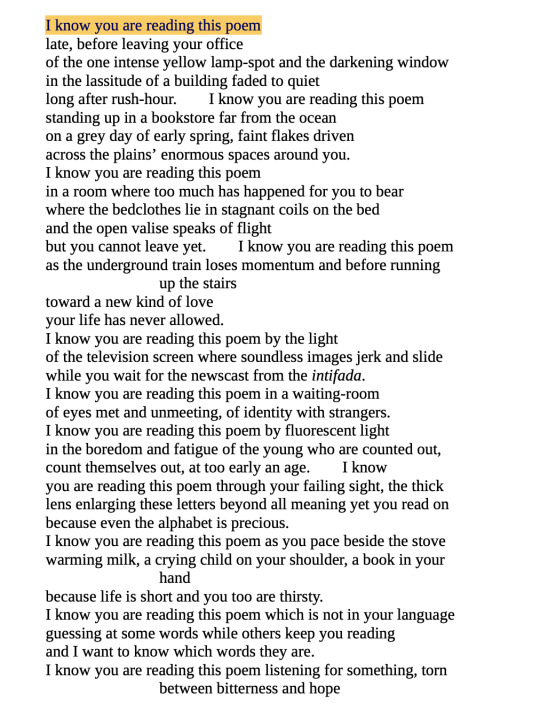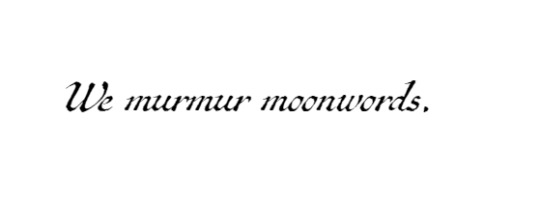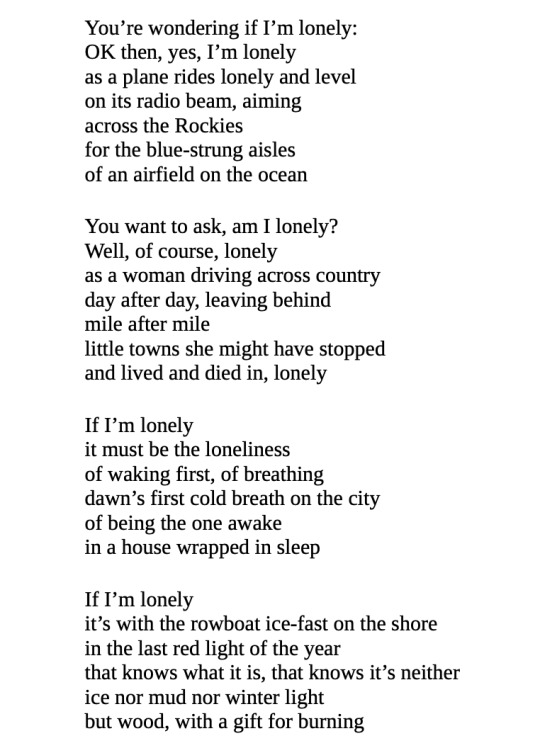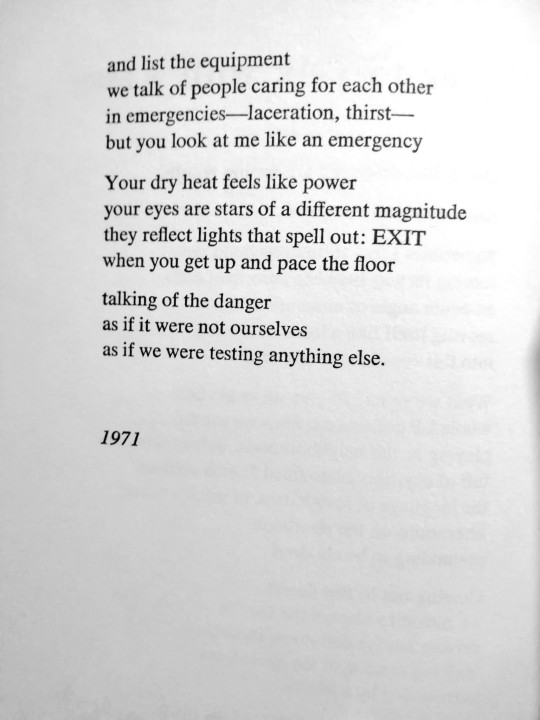#adrienne rich
Text


XIII (dedications) by Adrienne Rich
2K notes
·
View notes
Text

Adrienne Rich, from "The Floating Poem, Unnumbered", Collected Poems: 1950-2012 [ID'd]
2K notes
·
View notes
Text

Adrienne Rich, from Collected Poems: 1950-2012; “Two Songs,” (edited)
699 notes
·
View notes
Text

this adrienne rich excerpt, always always
18K notes
·
View notes
Note
from a non-academic, i find parts of comphet to be useful (heterosexuality becomes compulsory when you’re raised in a heterosexual society) but the foundations . suck. what do we do with theories like this, that have touched on a truth but also carry a lot of garbage? can we separate the truth from the founder?
i have to be slightly pedantic and say that i don't think rich's essay is an example of this phenomenon. my central issue with her formulation is its bioessentialist assumptions about human sex and therefore also sexuality. if i say "capitalism includes economic mechanisms that enforce heterosexual behaviour and exclude other possibilities", then what i mean by "heterosexual" is plainly not the same as what rich means—and for this reason i would seldom formulate the statement this way, without clarifying that i am talking about the enforcement of heterosexuality as a part of the creation and defence of sex/gender categories themselves. so rich and i do not actually agree on the very fundamental premises of this paper! rich was not the first or only person to point out that economic mechanisms as well as resultant social norms enforce heterosexual pairings; i actually don't even think the essay does a very clear job of interrogating the relationship between labour, economy, and the creation of sex/gender; she means something different and essentialist to what i mean by sex and sexuality; and i think her proposed responses to the phenomenon she identifies as 'compulsory heterosexuality' are uninteresting because they mainly propose psychological answers to a problem arising from conditions of political economy. so, in regards to this specific paper, i am actually totally comfortable just saying that it's not a useful formulation, and i don't feel a need to rescue elements of it.
in general, i do know what you're talking about, and i think there's a false dichotomy here: as though we must either discard an idea entirely if it has elements we dislike, or we accept it on the condition that we can plausibly claim these elements and their author are irrelevant. these are not comprehensive options. instead, i would posit that every theory, hypothesis, or idea is laden with context, including values held and assumptions made by their progenitors. the point is not to find a mythical 'objective' truth unburdened by human bias or mistakes; this is impossible. instead, i think we need to take seriously the elements of an idea that we object to. why are they there? what sorts of assumptions or arguments motivate them, and are those actually separable from whatever we like in the idea? if so, can we be clear about which aspects of the theory are still useful or applicable, and where it is that the objectionable elements arise? and if we can identify these points, then what might we propose instead? this is all much more useful, imo, than either waiting for a perfect morally unimpeachable theory or trying to 'accept' a theory without grappling with its origins (political, social, intellectual).
a recent example that you might find interesting as a kind of case study is j lorand matory's book the fetish revisited, which argues that the 'fetish' concept in freud's and marx's work drew from their respective understandings of afro-atlantic gods. in other words, when marx said capitalists "fetishise" commodities or freud spoke about sexual "fetishism", they were each claiming that viewing an object as agentive, meaning-laden in itself (ie, devoid of the context of human meaning-making as a social and political activity) was comparable to 'primitive' and delusory religious practices.
matory's point here isn't that we should reject marx's entire contribution to political economy because he was racist, nor is it that we can somehow accept parts of what marx said by just excising any racist bits. rather, matory asks us to grapple seriously with the role that marx's anthropologically inflected racism plays in his ideas, and what limitations it imposes on them. why is it that marx could identify the commodity as being discursively abstracted and 'fetishised', but did not apply this understanding to other ideas and objects in a consistent way? and how is his understanding of this process of 'fetishisation' shaped by his beliefs about afro-atlantic peoples, and their 'intelligence' or civilisational achievements in comparison to northwestern europeans'? by this critique matory is able to nuance the fetish concept, and to argue that marx's formulation of it was both reductive and inconsistently applied (analogously to how freud viewed only some sexuality as 'fetishistic'). it is true in some sense that capital and the commodity are reified and abstracted in a manner comparable to the creation of a metaphysical entity, but what we get from matory is both a better, more nuanced understanding of this process of meaning-making (incl. a challenge to the racist idea of afro-atlantic gods as simply a result of inferior intelligence or cultural development), and the critical point that if this is fetishism, then we must understand a lot more human discourse and activity as hinging on fetishisation.
the answer of what we do with the shitty or poorly formulated parts of a theory won't always be the same, obviously; this is a dialogue we probably need to have (and then have again) every time we evaluate an idea or theory. but i hope this gives you some jumping-off points to consider, and an idea of what it might look like to grapple with ideas as things inherently shaped by people—and our biases and assumptions and failings—without assuming that means we can or should just discard them any time those failings show through. the point is not to waste time trying to find something objective, but to understand the subjective in its context and with its strengths and limitations, and then to decide from there what use we can or should make of it.
541 notes
·
View notes
Text

Adrienne Rich, Fox: Poems 1998-2000; from ‘If Your Name Is on the List’ (edited excerpt)
2K notes
·
View notes
Text
The entire history of women’s struggle for self-determination has been muffled in silence over and over. One serious cultural obstacle encountered by any feminist writer is that each feminist work has tended to be received as if it emerged from nowhere; as if each of us had lived, thought, and worked without any historical past or contextual present. This is one of the ways in which women’s work and thinking has been made to seem sporadic, errant, orphaned of any tradition of its own.
Adrienne Rich, On Lies, Secrets, and Silence
352 notes
·
View notes
Quote
You touched me in places so deep. I wanted to ignore you.
Adrienne Rich, from The School Among The Ruins
#Adrienne Rich#motivation#quotes#poetry#literature#relationship quotes#writing#original#words#love#relationship#thoughts#lit#prose#spilled ink#inspiring quotes#life quotes#quoteoftheday#love quotes#poem#aesthetic
221 notes
·
View notes
Text
—eye to eye measuring each other's spirit,
each other's limitless desire,
Adrienne Rich, from The Dream of a Common Language
208 notes
·
View notes
Quote
You touched me in places so deep. I wanted to ignore you.
Adrienne Rich, from The School Among The Ruins
#Adrienne Rich#motivation#quotes#poetry#literature#relationship quotes#writing#original#words#love#relationship#thoughts#lit#prose#spilled ink#inspiring quotes#life quotes#quoteoftheday#love quotes#poem#aesthetic
393 notes
·
View notes
Text

— Planetarium, by Adrienne Rich
#Adrienne Rich#chaotic academia#light academia#poetry#dark academia#dead poets society#literature#books and libraries#quotes#literature aesthetic#light academia aesthetic#poetry quotes#writing#words#quote aesthetic#romantic academia#romanticism#dark academia aesthetic#quotes aesthetic#tumblr poets#classic lit#lit#literature quotes
663 notes
·
View notes
Text

song by Adrienne Rich
893 notes
·
View notes
Text


rereading Diving into the Wreck by Adrienne Rich and i forgot how insane it was
[Text ID in ALT text]
#this is the first poem in the book#i read the first few lines alone and i yelled#adrienne rich#trying to talk with a man#diving into the wreck#poem#poetry
405 notes
·
View notes
Text

Adrienne Rich, from Poems; “The Burning of Paper Instead of Children,”
1K notes
·
View notes
Text

“There must be those among whom we can sit down and weep and still be counted as warriors.”
— Adrienne Rich
#adrienne rich#literature#lit#literature lover#literature quote#literature quotes#english literature#philosophy#philosophical#philosopher#philosophers#philosophy of life#philosophy quotes#quote#quotes#excerpts#excerpt#quoteoftheday#booklover#book#books#bookworm#booklr#book quotes#book quotations
157 notes
·
View notes
Note
can you elaborate some on how the formulation of comphet sucks? i’m not super familiar with it & i trust your thoughts
well i am just some guy blogging also you can read the essay here if you're interested.
there is a clear streak of sexual conservatism that runs through the text (eg, the equation of bdsm with violence & 'vanilla' sex with a 'natural' & intrinsically 'feminine' sexuality that is being stifled; the failure to contextualise sex work as work; the attempt to differentiate gay men from lesbians on the grounds that gay men have too much casual sex & large age gaps in their relationships...) & these are not just local issues because they're all connected to the fact that rich is fundamentally uninterested in questioning gender (that is, the construction of womanhood itself) the way she is in questioning heterosexuality.
her formulation therefore always falls back on the notion of a shared biological basis for a 'female' existence, one that is continually violated & encroached upon by the male violence that oppresses it. to understand 'compulsory heterosexuality' in light of a concept of gender as biological, transhistorical, & inescapable thus becomes a call to reclaim a kind of mythologised prelapsarian 'female–female' relationship that is being artificially suppressed & oppressed under conditions of patriarchy. the question rich raises as animating the paper is: would women choose heterosexuality if they were not constrained into it? but never is this category 'women' historicised or problematised in the same way (glibly we might ask: would people choose womanhood, or indeed manhood, if we were not constrained into them...?); for rich the sexes simply exist; the question lies only in the correct relations between & within them.
i don't really find her idea of a 'lesbian continuum' is particularly useful & i think it elides discussion of the material factors that enforce heterosexuality with a more idealist, psychologised discourse about the comparative emotional 'valuation' of basically any interpersonal relationship. but that move away from material analysis also just characterises the whole essay, really, because again, rich takes as a point of departure the presumption of the reality & primacy of the sexgender binary whilst trying to analyse the artificiality of heterosexuality alone. really this is just business as usual in terms of talking out both sides of your mouth for radical feminism though, & indeed for any feminism reliant on essentialisms at its core.
566 notes
·
View notes